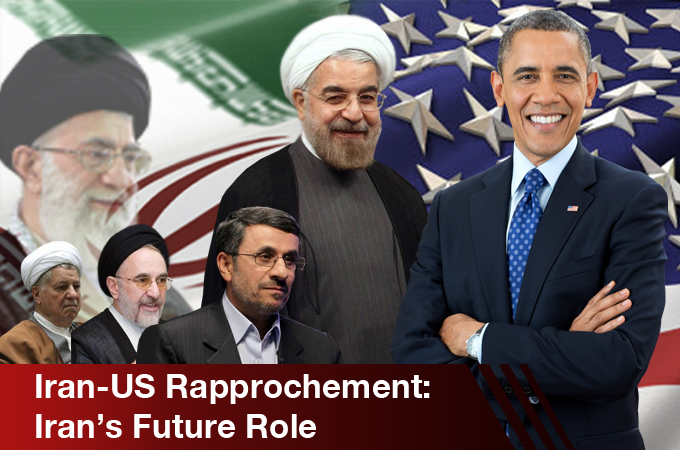
 |
| [AlJazeera] |
The successful development of Iran’s status in the region is reflected in the Geneva nuclear capabilities agreement between Iran and the P5+1 countries. Since Iranian President Hassan Rouhani stated that “international relations are no longer a zero-sum game, but rather a multi-dimensional space in which competition and cooperation coincide,” the relationship between the Iran and the United States has moved in a new direction.
“Constructive engagement,” a term that has recently entered the lexicon of Iranian foreign policy, is part of the Iranian government’s attempt to reform the economy. This reform is necessary to meet the needs of Iranian society and strengthen Iran’s international status. It is clear that easing tension with the United States and the West is strongly linked with achieving these goals; indeed, Iran’s role as a mediator or enforcer in international geopolitics and economics cannot be denied.
The “Geneva Accord” (Joint Plan of Action) is fraught with adversities and obstacles, and there have been many recent debates on the consequences of Iranian-American rapprochement on the regional balance of power. Opinions vary – some believe rapprochement will reshape the region's map and have a long term impact, while others downplay the consequences of rapprochement and question the probability of its success.
This research project outlines and discusses the future of Iranian-American rapprochement and Iran’s expanding international role and impacts. The components of the project were written by Iranian affairs and international relations researchers and experts.
1. Iranian Foreign Policy: Future Directions
Will there be new changes in Iranian foreign policy? How realistic and sincere is the claim that Iran's foreign policy has moved from negative confrontation to positive vision and interaction with the world? In this context, Dr. Arshin Adib-Moghaddam, head of the Centre for Iranian Studies at the University of London, discusses changes in Iranian foreign policy brought about by Rouhani’s presidency in his paper titled Iran in World Politics After Rouhani, with particular focus on the persistent strategic preferences of the Iranian state.
2. Form and Future of Iranian-American Rapprochement
Iranian officials have suggested coordination and cooperation with the United States on a number of matters, the first being on the issue of terrorism. Three papers discuss this theme and address the following questions: What is the future of Iran-US rapprochement? Will relations between the two countries remain within the confines of an exchange of interests (called by Rouhani a “competition and cooperation” policy) or will they experience improvement in the future? What are the effects of this rapprochement on Iran's Arab neighbours, particularly Saudi Arabia?
Ambassador Seyed Hossein Mousavian, former member of the nuclear issue negotiating team and visiting scholar at Princeton University, details trends within three different ideological schools in Iran’s political arena with regard to relations with Washington in a paper titled Future of Iran-US Relations.
Farah Al-Zaman Abu Shuair, a Tehran-based researcher and media activist, offers internal reactions on rapprochement in a paper titled Domestic Voices: Actors in Iran’s Political Arena. She reviews Iranian political parties’ positions on the issue of Iranian-American rapprochement and looks at the reasons some reject rapprochement while others accept and defend it. The prominent Supreme Leader Institution Party is one example – it does not impede negotiations with Washington about the nuclear issue but remains cautious about the success of rapprochement.
Dr. Mark Katz, professor of international relations at the American George Mason University, compares Iranian-American rapprochement with the unsuccessful model of US rapprochement with the Soviet Union as well as with the successful model of the US-China rapprochement in his paper titled Mechanisms of Iran-US Rapprochement: Lessons from the Past .
3. Iran-US Rapprochement and Security
Dr. Fatima Al-Smadi, a researcher at the Al Jazeera Centre for Studies, addresses this theme in her paper titled Iran-US Rapprochement: Where Does the Path to Jerusalem Cross? The paper discusses effects of rapprochement on the Palestinian cause as well as monitors internal socio-economic indicators foretelling a shift in Iranian politics and discourse.
4. Rapprochement: Relationships and Influence
Papers addressing this theme examine the potential impact of the Iranian-American rapprochement on Iran's regional and international relations and reach.
“Smart cooperation” with Russia enabled Iran to change the game in Iraq and Syria, begging the question of whether this relationship with Russia will continue or be lost at the expense of Iran’s newfound cooperation with the US? Answers to these questions are offered by Russian researcher specialist in international relations, Karina Fayzullina, in her paper titled Iran-Russia Relations in Light of Iran-US Rapprochement.
Iranian relations with Turkey are increasingly important and influential in the context of regional transformation witnessed by the Arab world, and Dr. Mohammad Jaber Thalji, researcher and specialist in Turkish affairs, addresses this in a paper titled Iran-US Rapprochement and Iran-Turkey Relations: Potential Opportunities and Threats.
Dr. Sebastien Peyrouse, research professor of international affairs at George Washington University, discusses the increasing role that Iran can play in Afghanistan and Central Asia (Kazakhstan, Kyrgyzstan, Tajikistan, Turkmenistan, and Uzbekistan) in his paper titled Iran’s Growing Role in Central Asia? Geopolitical, Economic and Political Profit and Loss Account.
5. Summary and Results
The concluding section offers the reader a comprehensive overview of findings and results from the project.